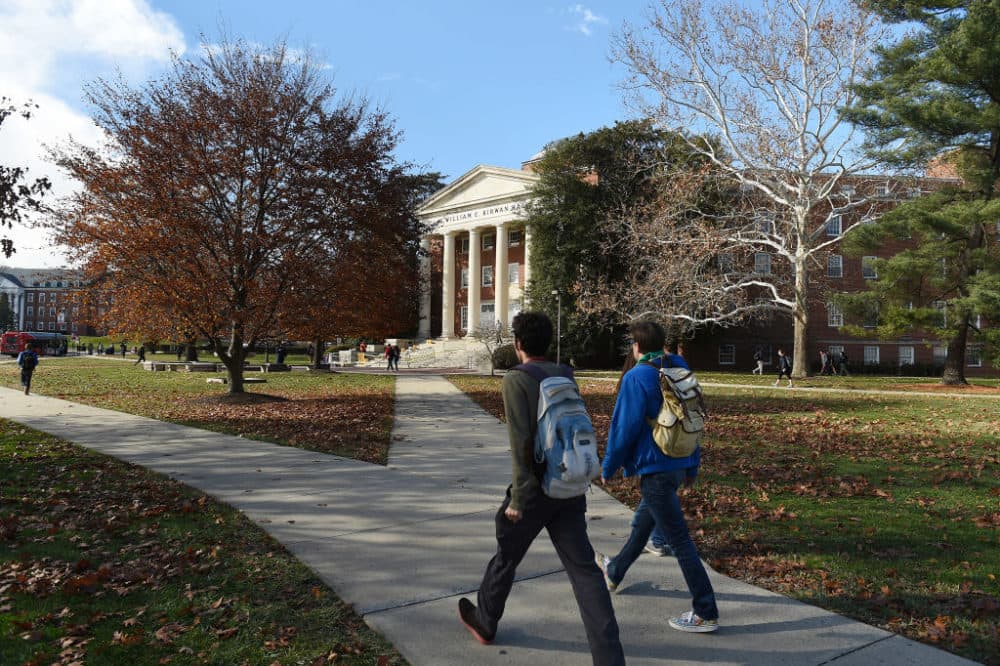Advertisement
Commentary
College may look different for your pandemic-era kid. That's OK

Last night I had a dream that I had returned to college in my 40s, despite the fact that I have a Ph.D. This wasn’t the first time I’ve had this dream in the past few months. In this most recent version, the school was too small and the policies too infantilizing. It was only the first week — and I knew already that I’d made the wrong decision. I was anxious, sad, overwhelmed. I felt trapped. This was not what college and a newfound independence were supposed to be.
It doesn’t take a psychologist to interpret this dream, even though I am one.
My eldest son is a senior in high school applying to college. When he was in the 8th grade, I had a recurring dream of being forced to repeat high school at a Hogwarts-like institution. I couldn’t remember my locker combination or schedule and I kept missing assignments because I was trying to keep up with work from my job.
My anxieties (and my dreams) are not subtle.
My son was born in the mini-boom of the early aughts, before the Great Recession. Finding daycare slots for his cohort required putting babies on lists … before they were born. Now, he is among a record number of college applicants, after many high school seniors last year deferred their applications and enrollment due to the uncertainty of COVID-19.
The past two years have presented unprecedented challenges to my patients and their parents … and, to me.
There are currently a lot of 17- to 19-year-olds waiting on college admission decisions in an environment that was incredibly pressure-filled, competitive and biased — even before a global pandemic completely disrupted their education and lives for two years. Even those who applied for “early action” are being deferred to “regular decision.” Yet there is nothing “regular” about their experience.
I’ve worked as a pediatric psychologist for 15 years. Many of my patients are in high school and college. They are among those whose mental health has been most impacted by the global pandemic and this is evident in our sessions, when we talk about the disruptions to their social lives, education and plans.
As a parent, I am not generally prone to anxiety. I know that worrying too much about children’s success makes parents controlling, and being too concerned about their happiness makes us overly permissive — neither of which is good for them. I actually wrote a book about it. But the past two years have presented unprecedented challenges to my patients and their parents … and, to me.
For parents to effectively manage worries for their children’s future, they need to feel some semblance of control over today. For much of the past two years, I haven’t been able to plan a trip to see grandparents one state away with any degree of certainty, let alone schedule college tours or encourage my son to do an internship to explore his career interests.
This generation will not experience college as we once knew it to be.
I worry that after years of hybrid school and fewer tests and quizzes, my son isn’t prepared with the study skills he’ll need in college. I worry that a few virtual visits and a handful of in person outdoor only campus tours is not enough information for him to make a choice as consequential as where to go to college. I’m worried that if he decides to enroll in a school far away, he could be sent home or stranded if we get much further down the Greek alphabet.
When students struggle in school with learning disabilities, psychologists make two categories of recommendations to support them: remediation and accommodation. Remediation involves changes to the curriculum to teach them the skills they are lacking or lagging in. It implies corrective action, a sort of going back. But while the omnicron variant may be less lethal, it proves beyond a doubt that there is no going back to pre-pandemic times. This generation will not experience college as we once knew it to be.
I think our teens need and deserve ongoing accommodation. Accommodation involves changes to the environment to better suit and support a student’s needs at that time, making the right-here-and-now a better fit for the person in front of us. We adults have to get comfortable with the idea that accommodation does not mean “less than.” At its best ideal, it is a move toward equity, a true leveling of the playing field. That’s something the college application process needed well before the pandemic. What if we could see this time as an opportunity for corrective action toward a new and better normal?
I see this happening already. For example, every school my son applied to was “test optional” for SAT/ ACT scores. A patient of mine, who was kicked out of the dorms in a distant city during the first semester freshman year, has been living off campus since. This gives her stability when classes go remote and has had the added benefit of teaching her much better independent living skills than she would have gotten in a dorm. Others have taken a semester off and accepted that college will be five years instead of four, or decided to forego college altogether to become EMTs, at a time when that job is in increasing demand.
If we’re honest with ourselves, we don’t know any more or less about what it holds for them than we ever did.
In some cases, this has required their parents to adjust and accommodate their own dreams and expectations for their child. Parents have to accept that our children’s lives are simply not the same as they would have been without living formative years in a global pandemic. There are lost opportunities and experiences to grieve. But as with any loss or challenge, there could also be new space for positive change, a chance for our kids to take a path they never would have otherwise, and find success and happiness there.
In my dream, I called my mom. I cried and told her all the reasons the college I had chosen was not the right fit for me after all. She made some suggestions for accommodations I could request or alternatives I could pursue. She did what I should do if my son calls me in 9 months having made the wrong decision for him. Then, weirdly, two trusted colleagues from the hospital where I work showed up. They reminded me I had the skills and knowledge I needed to advocate for change if I decided to stay, and to find something better if I decided to leave. They didn’t seem worried. Perhaps my subconscious was telling me I shouldn’t be either.
When my patients come to me with struggles, indecision or having made a flat-out wrong choice, I remind them that they already have the tools they need. There may have been delays and speed bumps on their path through adolescence, but they have been uniquely prepared for this moment in time just by living through it. It’s the adults’ job to help make the accommodations toward a better new normal. And it’s the parents’ job to reign in the worries and anxieties for our children’s future.
If we’re honest with ourselves, we don’t know any more or less about what it holds for them than we ever did.
